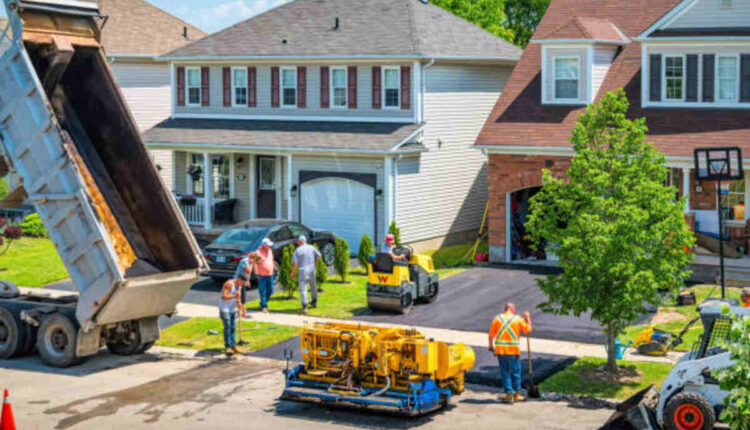Asphalt is a versatile paving material that can be used for road and parking lot overlays, resurfacing projects, and pothole repair work. Choose the best Asphalt Paving Contractors in Irvine.
Excellent asphalt paving requires high-quality materials and full-quality management to ensure durability, safety, and value for the investment made in asphalt paving projects.
Asphalt pavement consists of aggregates such as crushed stone, gravel, and sand, as well as bitumen – a dark, viscous substance derived from petroleum byproducts – as its primary components.
Durability
Asphalt is a highly long-term material, making it the top choice for roads and parking lots. When properly maintained with proper care, asphalt surfaces can last over 25 years; however, many factors, such as climate elements, traffic volume, and quality of paving solutions, could potentially compromise this longevity.
Asphalt’s durability stems from its production process: its mixing and layering methods. At high temperatures, asphalt is mixed to produce a mixture that’s both hard enough to support vehicles and people but soft sufficient for flexible movement under stress – something achieved by combining various aggregate materials with a specific binder type.
This process takes place at specialized asphalt plants, where the mixture is carefully scrutinized and adjusted accordingly until its properties meet all specifications and standards. Once ready, it is transported directly to construction sites, where it will be laid out in layers.
Asphalt industry professionals are continually searching for ways to extend the life and durability of road and parking lot paving materials, with AI believing that total quality management from collection through the processing of aggregate materials is vital in doing this. This means sourcing top-quality materials and keeping up with innovations in performance testing, construction techniques, and quality assurance procedures.
Water Drainage
Drainage is an integral component of any pavement structure. Without adequate drainage systems in place, aggregate base and subgrade layers can weaken and deteriorate during wet weather, leading to cracking asphalt surfaces and potholes on their surface layer. Poor drainage also results in heave and cracking issues as well as pothole formation on their surface layers.
Asphalt paving includes drainage features both above and beneath its surface via shaping the land to enhance surface water drainage, while porous properties in asphalt help direct it toward grassy spots where it can best be managed.
Additionally, a 12 to 18-inch sand layer is installed underneath the aggregate base to increase its ability to drain water efficiently. When this proves insufficient, drain tile systems should be considered. They consist of an underground channel containing fabric filters, round river gravel, perforated pipes with catch basin connections or stormwater drainpipes, and perforated pipes designed to disperse incoming water into drainage channels, thereby protecting asphalt surfaces.
Asphalt pavement material is an ideal choice for both residential and commercial purposes, boasting exceptional slip resistance, drainage capability, and its dark color aiding snow/ice melting – providing safer passage in adverse weather conditions for vehicles and pedestrians alike.
Safety
Asphalt paving materials are generally more resilient than other options, making them less prone to developing potholes. Asphalt can also stand up better during snow and ice accumulation, making it an excellent choice for roads that see lots of snow and ice accumulation. Plus, asphalt absorbs sound rather than reflecting it.
There are a few essential safety considerations when working with asphalt. First, ensure workers wear appropriate PPE per manufacturer instructions – thermally insulated gloves to protect hands from hot asphalt, coveralls to shield skin against burns or solvent penetration, respiratory protection against fume inhalation and respiratory protection against fume inhalation are among them. Furthermore, make sure all appropriate signs are posted and all workers have access to Material Safety Data Sheets (MSDSs) of solvents used during the mixing process, as well as safety training courses for workers involved.
As well as vehicles and equipment being potentially hazardous, another potential hazard involves being struck by cars and equipment. To mitigate this hazard, always maintain a three-foot perimeter around all operating machinery or vehicles and make sure all workers know where emergency equipment can be found and how best to utilize it in an accident situation.
Be mindful that it can take several days for the new pavement to cure fully, so traffic must be rerouted for this duration – an effort that should aim at minimizing frustration for drivers while keeping them safe.
Value
Asphalt paving solutions offer numerous cost-saving benefits that make asphalt an economical and intelligent paving choice. Asphalt’s resistance to weather conditions helps it remain resilient over time and decreases the risk of potholes and cracking. It is also easy to maintain with its smooth surface, offering drivers an enjoyable driving experience while adding to overall property or business values.
Asphalt is also an eco-friendly material. Modern paving solutions use recycled asphalt pavement (RAP) and reclaimed asphalt shingles (RAS), meaning fewer raw materials end up in landfills while keeping quality and functionality in your paving solution.
Asphalt’s versatility makes it ideal for most pavement projects, enabling staged construction that gradually strengthens your pavement over time as new layers are added on top of existing layers.
Asphalt has been around for over 100 years, yet its availability today is finite. Oil refiners used to give out free material as it was made available, but now oil companies seek it as a valuable commodity, and the cost has become significantly more costly since 2002. Thanks to dynamic shear rheometer technology, however, consistency and performance in asphalt mixes have improved while decreasing the raw materials required.

